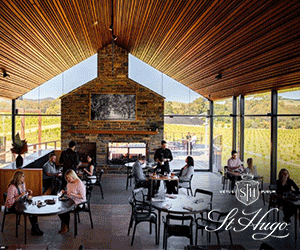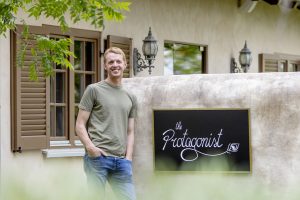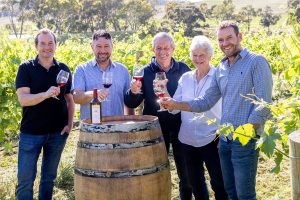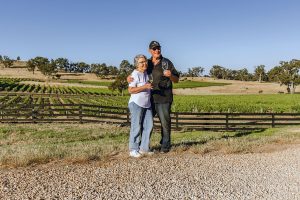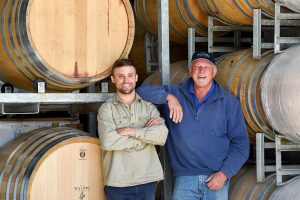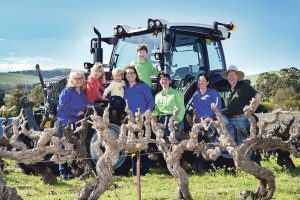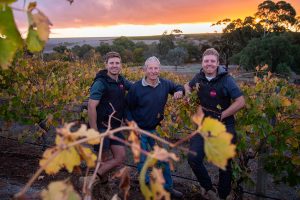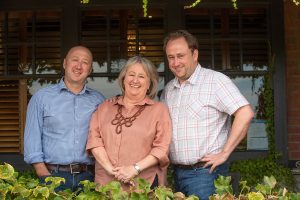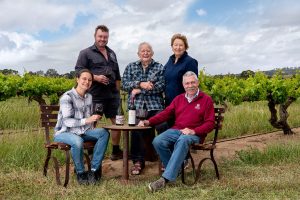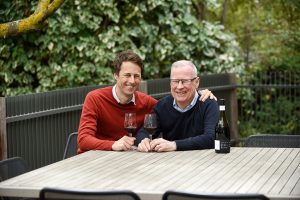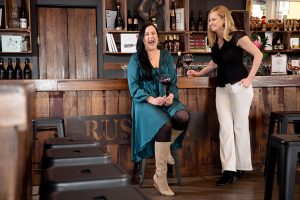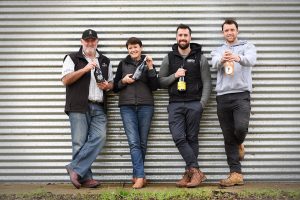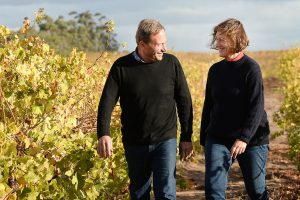
GENERATIONS IN WINE
Cirillo Estate –
a big little winery
WORDS & PHOTOGRAPHY Alicia Lüdi-Schutz
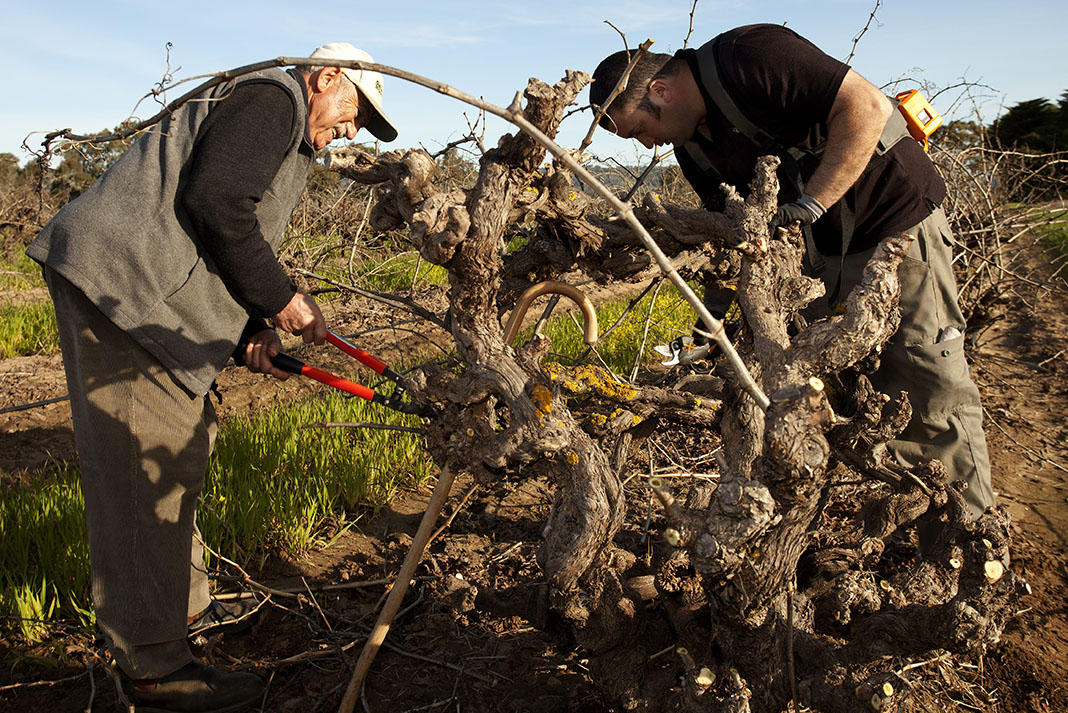
Vincent Cirillo’s worn and weathered hands are as gnarly as the 175-year-old Grenache, Shiraz and Semillon vines that grow alongside his family’s Nuriootpa homestead, on Nuraip Road.
Today, those hard-working hands hold a glass of Cirillo Estate Wines’ Vincent Grenache, as he chats to his winemaker son, Marco, who named the wine in his honour.
Marco represents nine generations of a family winemaking tradition that began in Southern Italy – and seeing that legacy continue in Australia is what puts the sparkle in Vincent’s eyes.
“Of course I’m proud of him, very proud of what he’s achieved up to date,” the 86 year old says in his Italian, Aussie accent. “He just doesn’t realise it!”
“He only says that when I’m out of the room,” laughs Marco, continuing the jovial banter around the oak barrels.
Sadly, Vincent never enjoyed such precious moments with his own father. He died when Vincent was just 12 years old and by 13, he was loading bags of wheat onto paddle steamers on the Murray River to make a living.
“Could you imagine seeing a child in the workforce like that today?” Marco says, as he shares the story of how his father arrived in the Barossa after immigrating from Italy with his parents. “Then he made his way up to North Queensland cutting sugar cane and ended up running some of the biggest pubs in Adelaide.”
In an era of fortifieds, Vincent introduced table wines to the popular saloon bars he managed over the years. Through the ’50s and ’60s he would travel to the Barossa to buy stock and always knew that’s where he wanted to build a future for his family.
So, in 1970, he and wife Lina bought an old vineyard and homestead where they worked hard, raised their children and still live today.
“I hit the nail on the head when I bought this property,” Vincent says.
“These vines are very old now, 175 years! When you’ve got old stock, it makes better wine than the young vines. These grapes are bloody beautiful!”

“When you look at the Ancestor Vine Grenache Register, we have just over half of the entire ancestor vine Grenache in the country.”
- Marco Cirillo
Marco couldn’t agree more and it’s part of the reason he became a winemaker. Growing up, he worked alongside his viticulturist father pruning those old vines that he would later discover, through researching Crown records, were planted by the Schilling family in 1848.
Those vines cover 13 and a half acres of the Cirillo property.
“When you look at the Ancestor Vine Grenache Register, we have just over half of the entire ancestor vine Grenache in the country,” Marco says.
Marco and Vincent are two of only five people who have been entrusted to prune the 1848 vines over the past 50 years, and it’s a labour-intensive process.
“If we had all young vineyards, it would be so much easier!” Marco says.
But he’s content with how his life has panned out, having made the decision to become a winemaker after a year in the automotive industry.
“I’m a car enthusiast, but I didn’t really like it as a job. One day, I popped in to see a friend working at Chateau Tanunda and he was working there on his own….I ended up helping out.
“So, it started from there. I did vintages around the Barossa, quite a few nationally and also in the South of France over about 15 years.
“I did study, but I didn’t complete it. I’m not great in a classroom, I’ll be honest! All the old winemakers were self-taught, and I guess if you love something, you’ll always find a way.”

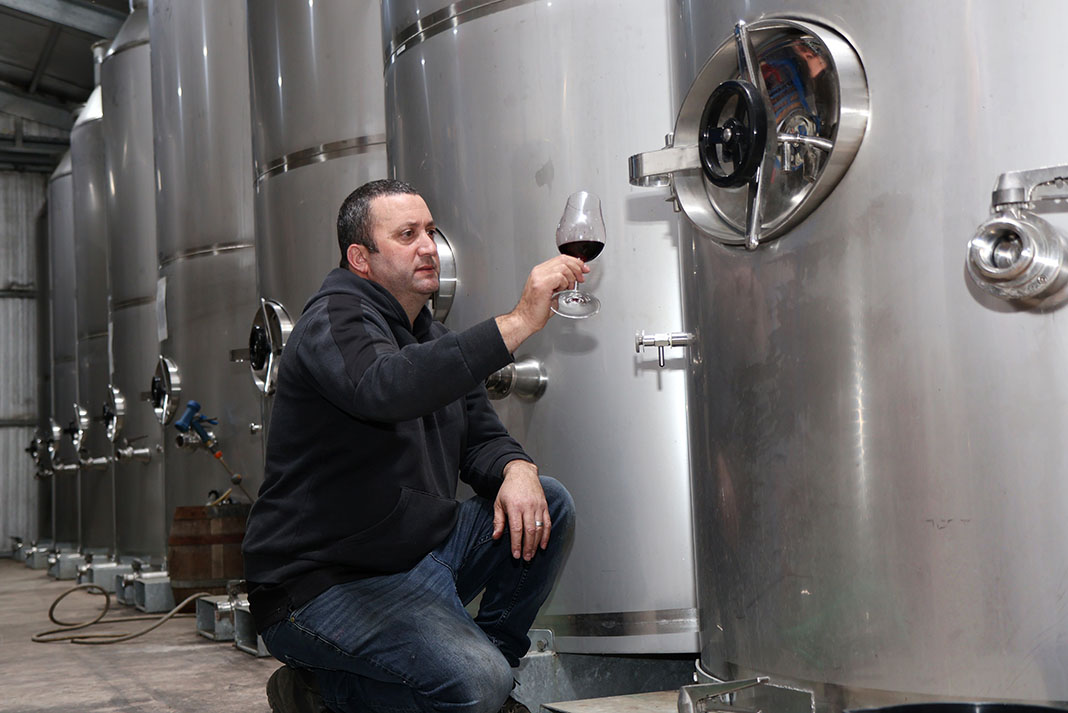
Marco’s experience led him to starting what he calls his “little big winery” in 2000 and now everything is done on site, except for bottling and labelling.
He admits it’s “hard work” and his body is “packing up” thanks to riding motocross, playing footy and driving rattly old tractors with no suspension, or springs under the seat.
“It’s been a tough 46 years!” he laughs, realising he’s now been running Cirillo Estate Wines for half his life.
Marco’s wife, Annika Lehmann, started working alongside him in 2015, and together with their daughters, Ella, aged five and Maya, seven, the family and the business have grown.
Today, Marco looks after about 50 acres, which includes new vineyards added to the estate, plus other Barossa vineyards he either manages or share farms.
The wine he produces includes more than 85 per cent estate grown fruit, with the remainder sourced locally.
“We make three reds and a rosato, a Southern Italian style rosé,” Marco explains.
“A lot of people make very pale, French style rosés and I thought I’m not French, I’m in Australia and Southern Italy is where our family comes from, so why would I?
“Then there’s the Semillon, which is a dirty word! But I’ll keep flying the flag for that one too, because you can’t just replant 175-year-old vines.
Marco is quick to point out that he “doesn’t do Italian varietals” and, despite his family’s Italian heritage, Sangiovese is off the list too.
“I work with old vine material mostly and that stuff wasn’t here 100 plus years ago. I tend to stick to what was more traditional to the Barossa,” he says.
Marco’s not one to keep up with the trends either, and he has to laugh about how popular Grenache has become lately.
“We love that Grenache is having a bit of a renaissance now. But I’ve basically spent half my life banging my head against a brick wall, trying to tell people about Grenache and now everyone wants to be on the bandwagon!
“I’ll still be here when they move onto the next exciting variety, because that’s what we do, and what we’ve always done here.”

You’ll notice Cirillo Estate’s wine labels feature family member’s names in a nod to the past and present. That’s set to continue.
“I’ve made a fortified from Semillon which will be named Annika and is about to be released,” Marco reveals. “And, one day, I will release a Limoncello which will be named after my mother, Lina.”
There’s also a special tribute to Annika’s late father and Barossa wine identity, Douglas Lehmann, with a fortified to be named The Douglas.
“He actually made a 1970 muscat on the valley floor, which I now have in my possession and I will release that as a 46-year-old muscat in 200ml bottles.”
Family and friends are at the very heart of Cirillo Estate Wines, and having a Cellar Door open by appointment only, grants Marco the time to enjoy them.
“I’ve collected a weird array of good mates through wine tastings, from house painters to surgeons. We are all like-minded and enjoy sitting around and laughing at the stupidity of the world,” he says.
“But I still find it odd when people want to know you because they’ve tasted your wine somewhere else in the world and come and find you.”
When he hears of wineries making beautiful parcels of fruit into generic red wine, he cringes. For Marco, becoming a winemaker was all about making something special and continuing a tradition.
“I’m not doing this to get my name in lights or be a hero,” he says. “This is just what our family does and has done for nine generations and hopefully there will be a 10th.”



